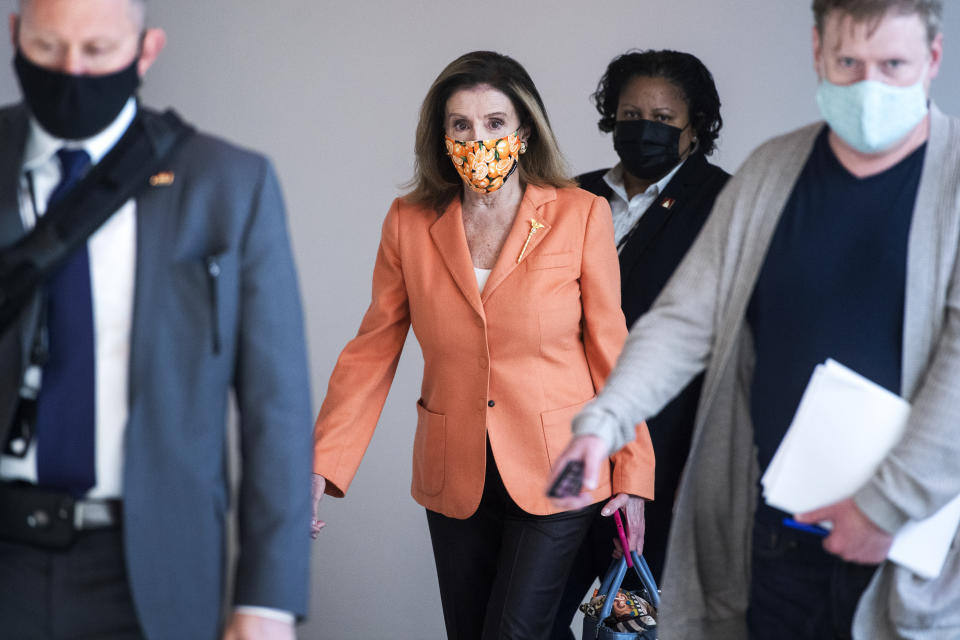‘It’s just not real’: Why this expert says to ignore to the ever-changing stimulus deadlines
This week the stimulus negotiations have been focused on a series of self-imposed 48-hour deadlines.
House Speaker Nancy Pelosi said on Sunday a deal was needed by Tuesday evening to implement something before the election. On Tuesday evening, she let the deadline pass and sent a letter to colleagues saying, “I remain hopeful that we can reach an agreement before the election.”
The clock started up again on Wednesday morning when White House Chief of staff Mark Meadows, in a Fox interview, set a new deadline, saying “we do share one goal and that is hopefully to get some kind of deal in the next 48 hours or so.”
Douglas Holtz-Eakin, who was chief economist of the President’s Council of Economic Advisers in the George W. Bush administration, has been involved in the highest levels of Congressional negotiations over the years and isn’t paying the ever shifting deadlines any mind. “It’s part of the political posturing,” he said in an interview with Yahoo Finance. “It’s just not real, it’s part of the theatrics.”

Negotiate ‘through the election’
Holtz-Eakin is skeptical any deal is likely before the election, predicting that the politics on the Democratic side will likely lead Pelosi to “negotiate optimistically cheerfully right through the election.”
“We had a purpose in the timetable,” Pelosi said Tuesday of the missed deadline, “which is that we would establish where we were.”
Republicans, likewise, are motivated to stay at the table and don’t want to be seen as walking away from relief for Americans.
The Biden campaign, Holtz-Eakin said, currently sits with a commanding lead in the polls and would not be inclined to a deal that could “change the ground on which the campaign is being run.”
Holtz-Eakin is president of the American Action Forum and has worked in a variety of influential economics roles for years. He was was director of the Congressional Budget Office in the early 2000s, and later worked as director of domestic and economic policy for the John McCain presidential campaign in 2007 and 2008.
On Wednesday, Pelosi and other officials flagged a range of outstanding issues where both sides remain apart – including spending on state and local governments, school safety, and limiting business liability.
‘What does [Trump] really want?’
The other factor that contributes to pessimism about any imminent deal is President Trump himself.
Earlier this month, Trump tweeted, “I have instructed my representatives to stop negotiating until after the election” before immediately reversing course. Soon enough he claimed to support an even bigger deal than the Democrats had proposed, and the Republicans appeared willing to accept.
Pelosi is holding up STIMULUS, not the Republicans!
— Donald J. Trump (@realDonaldTrump) October 15, 2020
“Did you ever hear a word called negotiation? We’re negotiating,” was the president’s response last week when confronted with his shifting positions at a town hall with NBC.
For Holtz-Eakin, the question is, “What does he really want in a stimulus bill? Your guess is as good as mine.”
And given the back and forth, don’t expect many experts in Washington to be waiting with bated breath Friday when the latest deadline approaches.
“There isn’t any natural deadline” outside of the election, Holtz-Eakin says, predicting that any new deadlines will continue to fall. “I don’t think it’s going to be a go until after the election.“
Ben Werschkul is a producer for Yahoo Finance in Washington, DC.
Read more:
Coronavirus stimulus: GOP's $500 billion plan fails in Senate as deadline for bigger deal looms
‘Trump will brag’: How Q3 GDP may factor into the last 5 days of the campaign
Read the latest financial and business news from Yahoo Finance
Follow Yahoo Finance on Twitter, Facebook, Instagram, Flipboard, LinkedIn, YouTube, and reddit.
